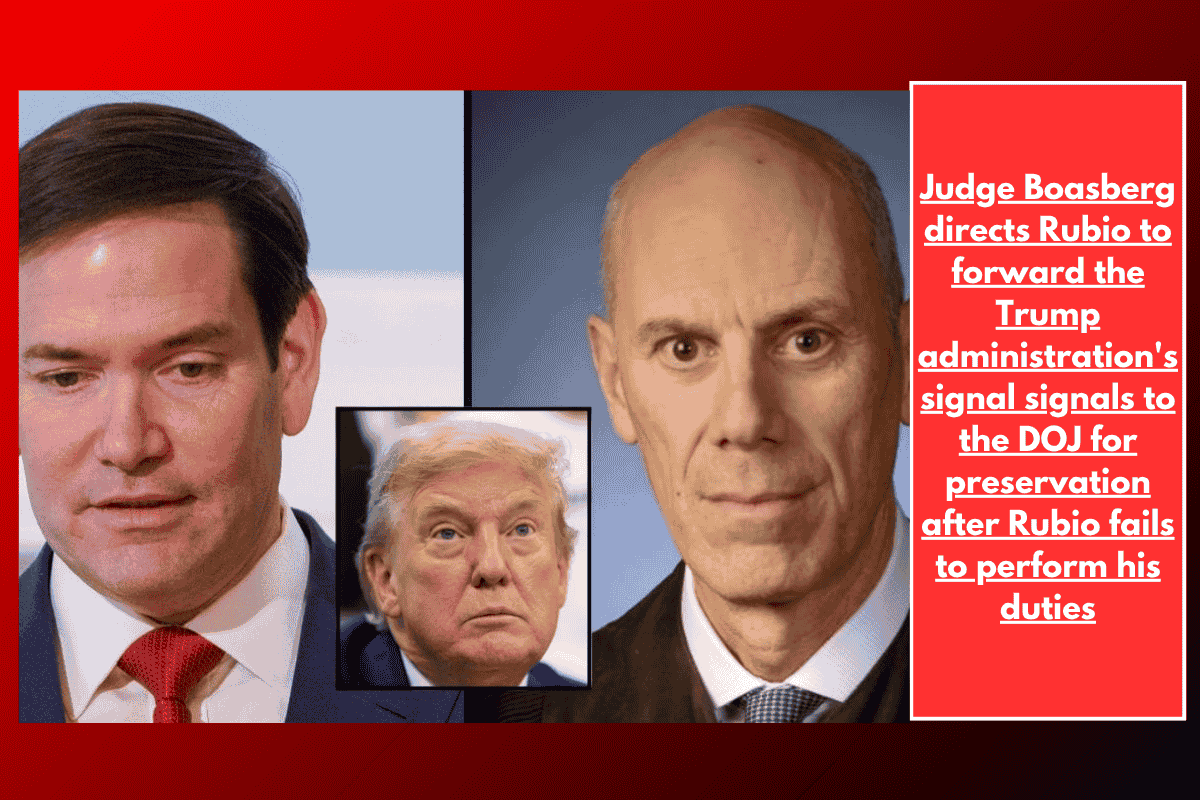WASHINGTON, D.C. — A federal judge has ruled that Marco Rubio, the acting United States Archivist, must transfer messages from the controversial Signal group chat to the Department of Justice (DOJ) for preservation and review. The chat, which involved Trump administration national security officials, gained significant attention after it was revealed that a journalist, Jeffrey Goldberg, had been accidentally added to the chain, sparking a major security breach.
The Lawsuit and Legal Battle
The lawsuit, filed by American Oversight, a nonprofit government watchdog, demanded that the Trump administration preserve the Signal messages related to the incident. The group argued that the unlawful deletion of records—coupled with the revelation of sensitive information—could compromise national security. American Oversight also requested a preliminary injunction to enforce record-keeping policies, ensuring that no further Signal messages would be deleted, and pushing Marco Rubio to act swiftly in ensuring the Department of Justice secured the data.
Court Ruling and Limitations
U.S. District Judge James Boasberg, an appointee of Barack Obama, issued his ruling on Friday. The judge dismissed some of the plaintiffs’ broader requests, particularly those related to recovering deleted messages. Boasberg found that the Signal messages were set to auto-delete, making them irrecoverable and therefore not subject to preservation. This was in line with the administration’s argument that Signal’s automatic deletion feature rendered certain communications unrecoverable.
However, Boasberg ruled that the government must preserve messages that have not yet been deleted, noting that the Attorney General could intervene to prevent the destruction of any remaining Signal communications. This is seen as a critical step to prevent further erasure of records and to ensure compliance with federal record-keeping laws.
The judge expressed concern that top government officials had failed to properly notify Marco Rubio of the existence of these messages and that Rubio had neglected his duties to ensure the preservation of these records. This has fueled concerns about government transparency and accountability regarding national security communications.
The Signal Scandal (“Signalgate”)
The Signal group chat scandal, also known as Signalgate, revolves around a conversation between Trump administration national security officials who were discussing a military strike against the Yemen-based Houthis. The journalist Jeffrey Goldberg was accidentally added to the chat, which contained sensitive national security information. This breach sparked an uproar, with critics pointing to it as an example of incompetence among senior Trump administration officials.
One of the key figures in the scandal was Mike Waltz, who was the national security advisor at the time. Waltz admitted to having created the chat and later acknowledged accidentally adding Goldberg. The fallout led to his removal from his position. Subsequently, Marco Rubio was appointed as his replacement, and in the wake of the scandal, Rubio was also tasked with overseeing the National Archives as the acting Archivist.
Next Steps and Government Action
Despite Boasberg’s limited ruling, American Oversight is not backing down. Chioma Chukwu, the organization’s executive director, emphasized the group’s intention to ensure compliance with the judge’s order. Chukwu stated that while the organization hopes the Trump administration will follow the ruling, they are prepared to take further legal action if necessary.
Chukwu said, “We expect immediate compliance — and if they drag their feet or fail to act, we are fully prepared to pursue further legal action to ensure government records, which belong to the public, are preserved and protected.”
National Security Concerns and Political Fallout
The Signal leak continues to be a point of contention as critics point out the security risks posed by such sensitive information being exposed. The breach has been particularly controversial because of the potential for foreign adversaries to exploit the exposed information. As tensions rise over the potential for military conflict in the Middle East, the scandal, often referred to as Signalgate, looms large, raising questions about the Trump administration’s handling of national security and its failure to secure critical communications.
While the ruling offers a narrow win for American Oversight by ensuring that messages not yet deleted are preserved, the Signal group chat scandal continues to underscore significant concerns about government transparency and the safeguarding of national security information. The Trump administration’s handling of the case and the failure to secure sensitive communications has opened up broader discussions about accountability at the highest levels of government.














